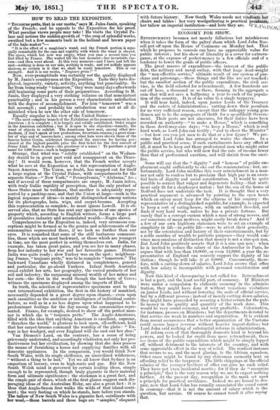ECONOMY FOR SHOW.
RETRENCHMENT becomes not merely fallacious but mischievous when it takes the form of the paltry sham which Lord John Rus- sell put off upon the House of Commons on Monday last. That which he proposes to concede can have no appreciable value for public interest ; but his show of liberality is a cover for extrava- gance, at the expense of pocket-money to a few officials and of a tendency to lower the grade of public officers. The great masses of expenditure—the interest of the public debt, the military and naval outlay, with that huge dead-weight the "non-effective service," ultimate result of our system of pur- chase and patronage,—these things and the like are not touched; but the smallest section of the public expenditure, the civil ser- vice, is the field selected for retrenchment. A few hundreds are cut off here, a thousand or so there, forming in the aggregate a sum that will not save a halfpenny a year to each of the popula- tion of the country. It is of no value to a single taxpayer. It will bear hard, indeed, upon junior Lords of the Treasury and the cadets of Administration ; cutting down their peculium for no very sufficient reason, except that the unhappy young gen- tlemen are to be the scapegoats of thrift for a spendthrift Govern- ment. Their posts are not sinecures, for their duties have been recorded on authority—" to make a House," which is something in these devil-may-care days ; " to keep a House," which is real hard work, as Lord John can testify ; " and to cheer the Minister" —but how can you get men to do that at a low figure ? We pre- sume that Lord John has arranged to waive the cheers. In a public and practical sense, if such curtailments have any effect at all, it must be to keep out those professional men who might enter the public service, but who will now find the rate of income lower than that of professional exertion, and will shrink from the sacri- fice.
Some will say that the " dignity " and " honour" of public em- ployment ought sufficiently to eke out the remuneration : but, un- fortunately, Lord John modifies this very retrenchment in a man- ner not only to confess but to proclaim that high pay is an essen- tial basis of dignity and social consideration. It would be quite possible to correct that vulgar and degenerate feeling—that senti- ment only fit for a shopkeeper nation ; but the son of the house of Bedford does not undertake the task. It is thought that a very practical argument is advanced by pointing to the open house which an envoy must keep for the citizens of his country : the representative of a distinguished republic, for example, is expected to keep a sort of eating-house, with an unlimited free-list, and finds it very hard work, unless he has a private fortune. But surely that is a corrupt custom which a man of strong nerves, and not conscious of mean motives, might easily break down ? And if a few of our own highborn statesmen were to set an example of simplicity in life—in public life—were to attest their generosity, not by the ostentation and luxury of their entertainments, but by a noble sacrifice of wealth to patriotic purposes—they would con-- vince men emulous of distinction that money is not a sine qua non. But Lord John positively asserts that it is a sine qua non : when he is invited to reduce the salary of the Ambassador in Paris, he argues that with less than 10,0001., or even 12,0001. a year the re- presentative of England can scarcely support the dignity of his station ; though he will take it at 8,0001. Concurrently, there- fore, with a cutting-down of salaries, Lord John avows that office with low salary is incompatible with personal consideration and dignity. Now this kind of cheeseparing is not called for. Retrenchment is but a part, and the least useful part, of economy. If Ministers were under a compulsion to elaborate economy in the adminis- tration, they might have done it without vexatious visitations on junior Lords, and without lowering the scale of official service, but by a different process : instead of merely cutting down salaries, they might have proceeded by securino.a a better return for the pub- lic money in the quality and quantity of the work done. This would be very sound economy, and very profitable. Colonization, for instance, presses on Ministers; but the departments devoted to that service are weak in numbers and organization. It is evident from recent occurrences that a better organization of the Customs could secure larger revenue without heavier import-duties ; but Lord John said nothing of substantial reforms in administration.
If reform even of that thoroughly domestic kind is beyond his powers, and he looked for credit from mere retrenchment, there are items of the public expenditure which might be simply lopped off, without detriment to the interests of the country, and with some appreciable effect in the way of relief. The readiest instance that occurs to us, and the most glaring, is the African squadron. Other cases might be found by any statesman earnestly bent on affording relief to the taxpayer. The little chippings at the official salaries of the younger brothers of office can give no such relief. They have not even incidental merits ; for if they do " recognize a principle," that is the very reason why we are to expect nothing further. At the present day, recognition is the mark set upon a principle for practical avoidance. Indeed we are bound to des- pair, now that Lord John has roundly enunciated the sound canon in economy—that it is not the amount of salary which is the question, but service. Of course he cannot touch it after saying that.


























 Previous page
Previous page